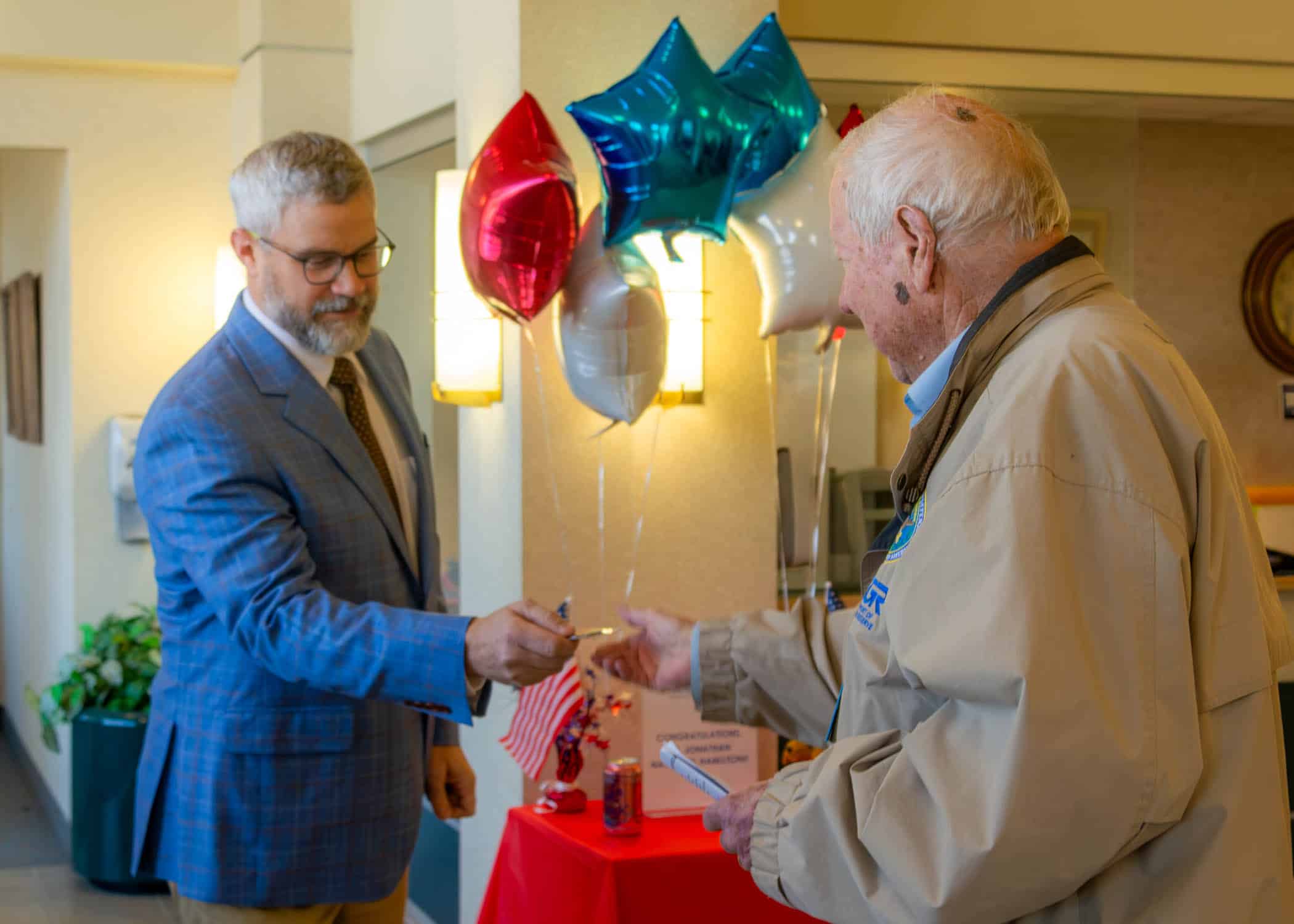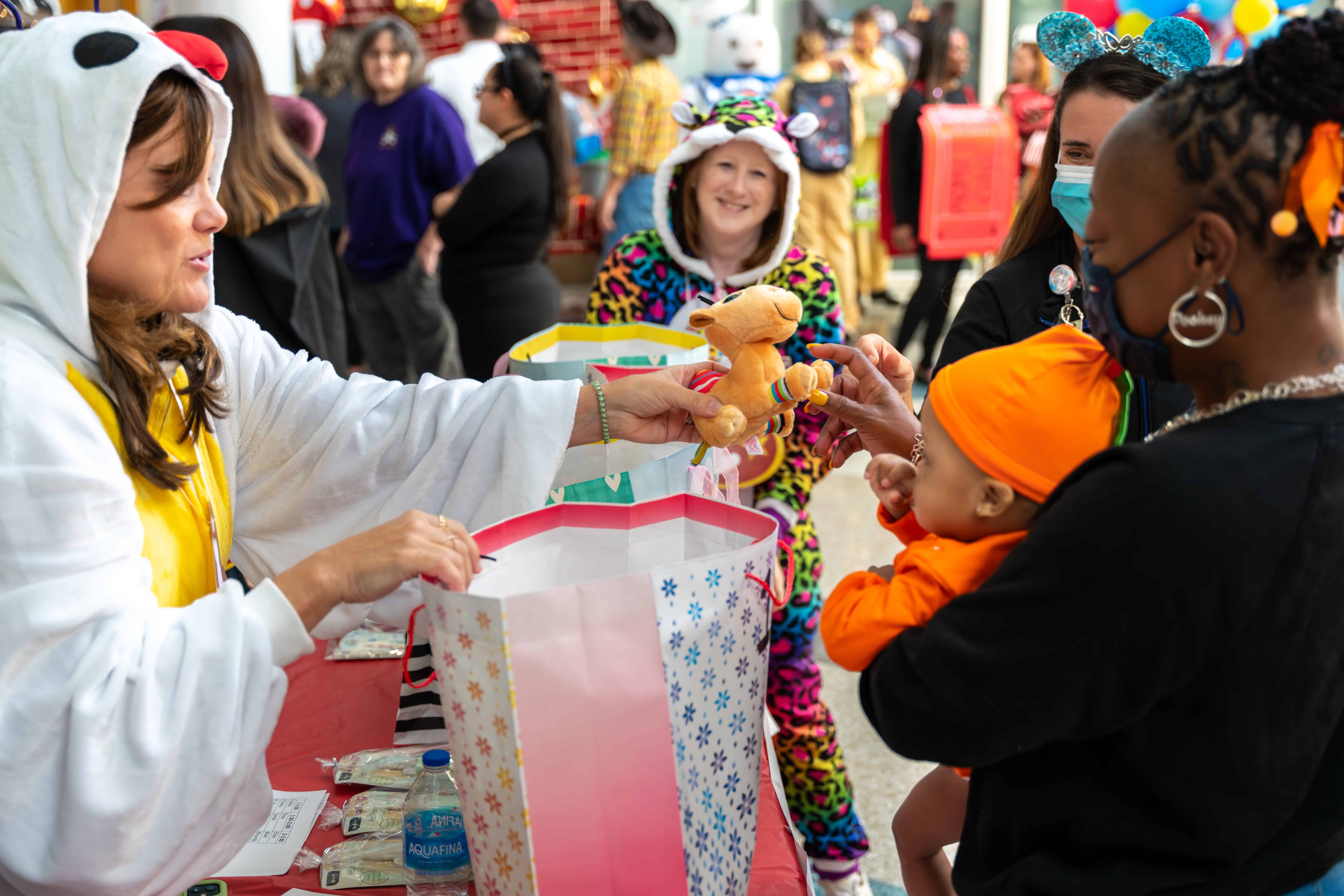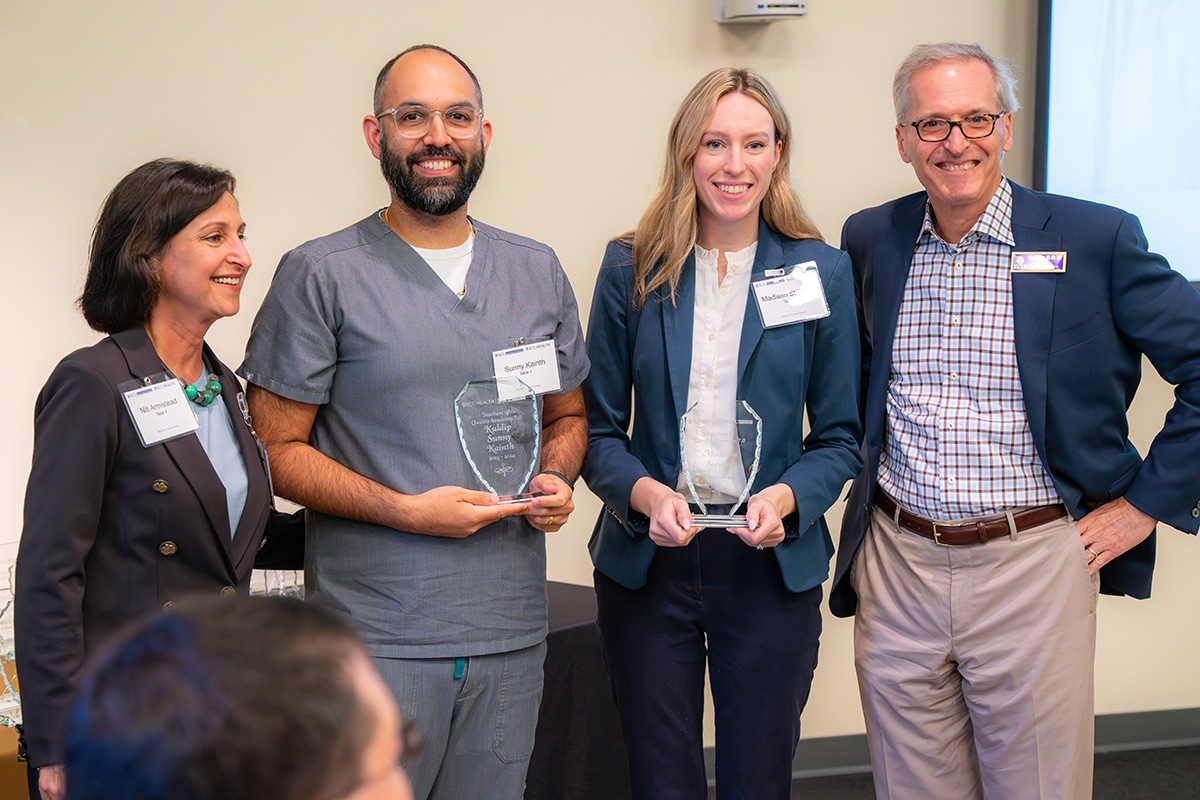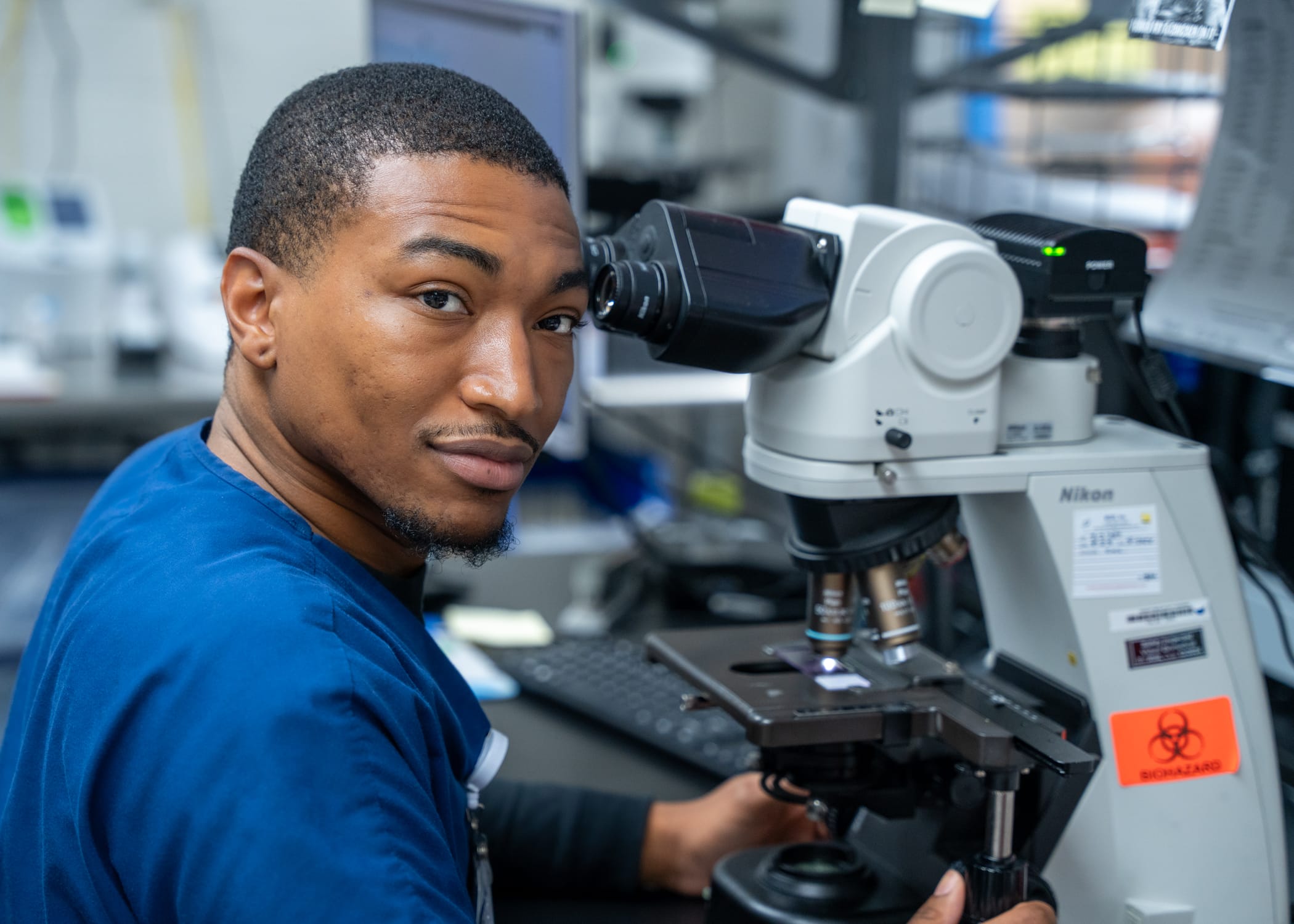A multidisciplinary group of physicians, health professionals, care teams, residents, fellows and students came together Wednesday for the 9th annual ECU Health Quality Improvement Symposium at Eastern AHEC. With educational sessions, a keynote speaker, podium presentations and a poster session, the day was jam packed with quality improvement initiatives and ideas from across ECU Health and East Carolina University’s Health Sciences Campus.
Dr. Michael Waldrum, ECU Health CEO and dean of the Brody School of Medicine, provided opening remarks at the symposium and reflected on his personal journey in quality improvement, which began 35 years ago and continues today.
“And in that 35 years, so much has changed, but really so much hasn’t changed. The essence of collaboration and caring and love is the essence of quality,” said Dr. Waldrum.
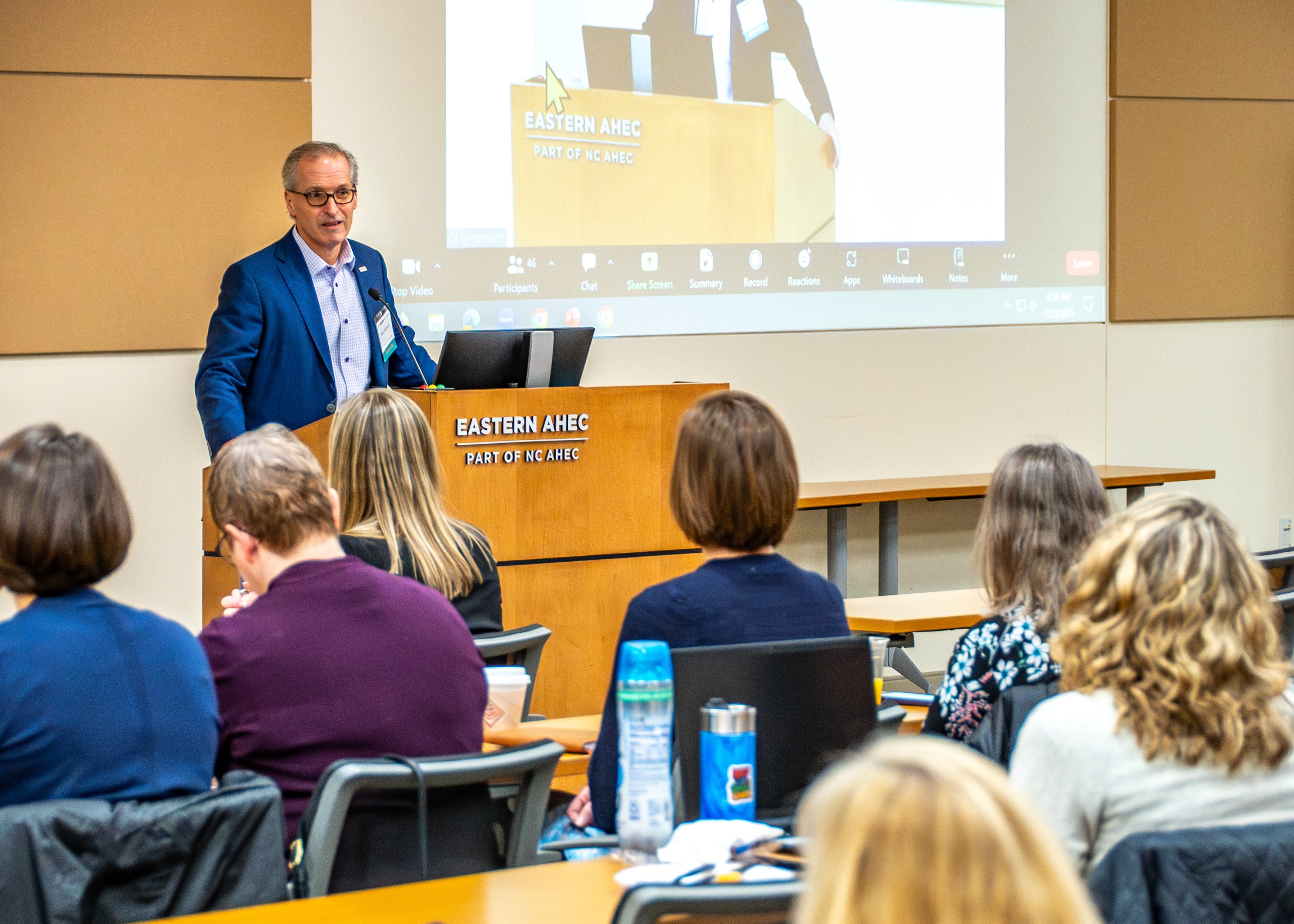
“The fact that you all care about your environments and each other and the patients we serve is what inspired me 35 years ago. Now, with changing technologies like artificial intelligence and other impacts to the care environment, the essence of quality, caring, taking care of each other and loving each other has never been more important. Thank you for doing that and carrying that message out for our organization, working in your units every day and living our values. That is who we are at ECU Health as we create the model for rural health care and educate the future health care professionals.”
Dr. David Tillman, chair of the Department of Public Health at Campbell University, provided keynote remarks to the group of 143 in-person and 63 virtual attendees. His presentation, “Rooted in Rural: Enhancing Patient Care and Quality Improvement by Valuing the Rural Context,” focused on understanding how engagement with rural communities provides essential insights for effective and empathetic health care.
“I’m based at Campbell and get to work closely with the communities in eastern North Carolina as do so many of the attendees here, and so often the rural context is forgotten in the broader quality improvement context,” said Dr. Tillman. “Having this topic as the keynote puts ‘rural’ at the center of quality improvement efforts. You can’t just replicate quality improvement efforts in rural communities. Instead, you have to think deeply about how it applies.”
The symposium showcased more than 40 projects related to system improvement, practice redesign and other methods for improving quality within health care and here in eastern North Carolina. The projects, categorized into podium presentations, poster presentations and works-in-progress presentations, offer a snapshot of ECU Health and the Brody School of Medicine’s commitment to driving continuous quality improvement across the health enterprise.
Awards for the top podium and poster presentations were announced following the showcase.
Podium Presentation:
Outstanding Podium Presentation: Michelle Ball, MSN, RN, CCRN-K, CIC, Infection Prevention, ECU Health Medical Center – “Standardization of Skin Antisepsis for Hip Replacement Surgery
Honorable Mention Podium Presentation: Dr. Nusiebeh Redpath, Perinatal-Neonatal Medicine, ECU Health Medical Center – “Increasing Parenting Activities in the NICU by Parents with Very Preterm Neonates”
Quick shot podium presentation:
Outstanding Quick Shot Podium Presentation: Alissa Meyerhoffer, MS2, LINC Scholar, Brody School of Medicine, ECU – “Improving Patient Throughput at the ECU Health Pediatric Specialty Clinic”
Honorable Mention Quick Shot Podium Presentation: Pankti Sheth, MS4 LINC Scholar, Brody School of Medicine, ECU – “Timely Extubation in Low-Birth Weight Preterm Infants Using a Standardized Protocol”
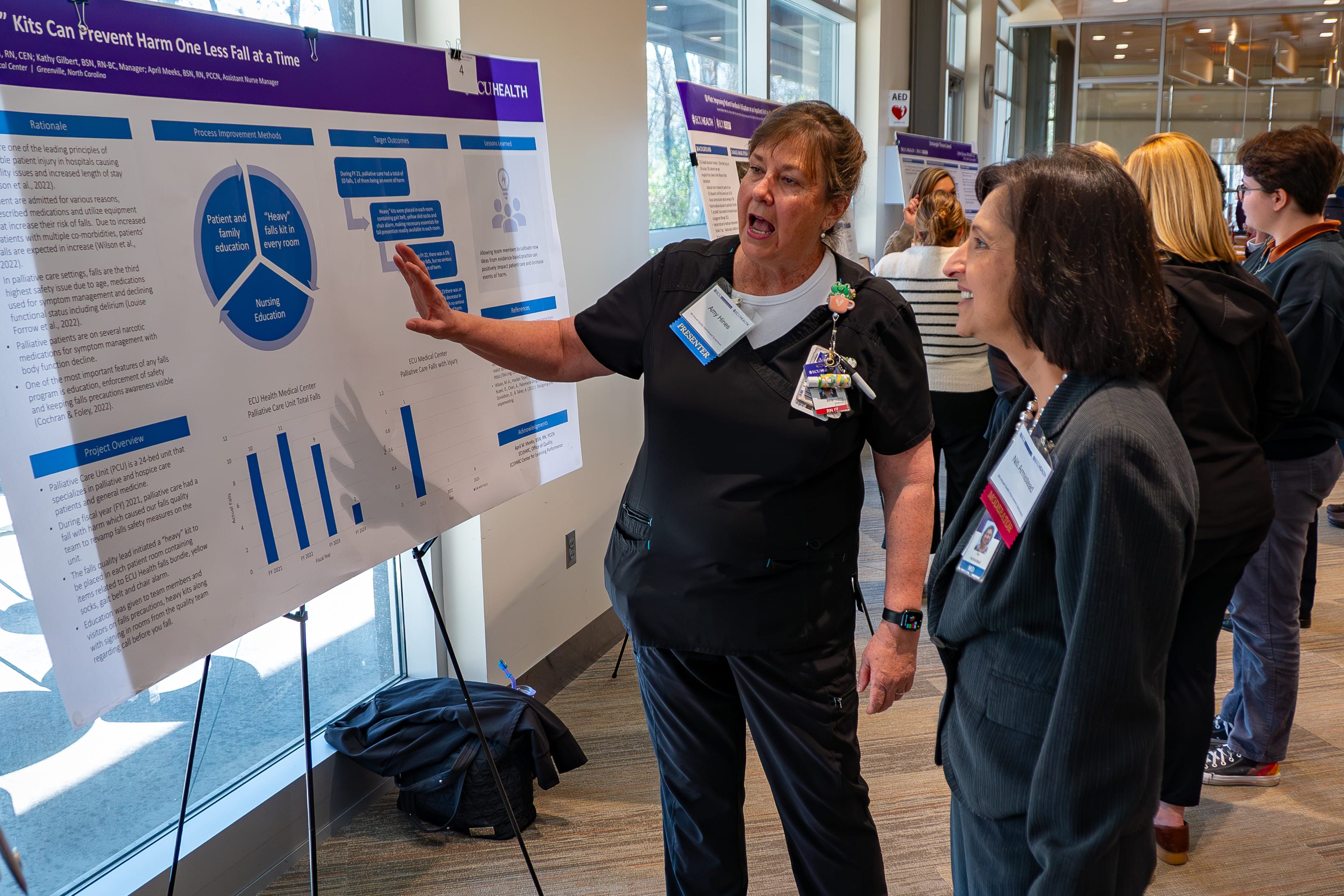
Honorable Mention Quick Shot Podium Presentation: Dr. Greeshma Sheri, Department of Internal Medicine, Brody School of Medicine, ECU – “Improving Inpatient Sleep Quality”
Poster presentation:
First Place Poster Presentation: Mariam Tariq Awana, MD, Internal Medicine and Pediatrics, Brody School of Medicine, ECU – “Enhancing HIV PrEP Prescription Adherence through Physician Education and Assessment”
Second Place Poster Presentation: Aimee Dunn, BSN, RN, CCRN, SCRN, Neurosciences Intensive Care Unit, ECU Health Medical Center – “Targeted Interventions for CAUTI Prevention: A Success Story in Reducing Infection Rates in the NSICU”
Third Place Poster Presentation: Missy Barrow, MA, LSSGB, Internal Medicine Community, ECU Health Medical Center – “Communication Between Hospital Allied Health and Primary Care Practitioners: A Collaborative Approach to Improving Hospital Discharge Summaries”
Dr. Jennifer Sutter serves as the current physician director of the Quality Improvement Symposium, helping presenters with their projects and supporting the judges as they review each body of work. But it wasn’t long ago that she herself was standing at the podium presenting her quality improvement work. The experience, she said, can benefit health care professionals in powerful ways.
“As a presenter, it can be nerve wracking to put yourself out there, but you get so much great feedback that can help you move your project forward,” Dr. Sutter said. “From my standpoint now, it’s great to create this environment where that learning and growth can happen. It takes a team to do quality improvement, and we have people here from across the health system who are collaborating to do just that. There’s nothing better.”
The day closed with two educational sessions designed to help those in attendance take the day’s learning and apply it to their mission-driven work.
Erika Taylor, clinical faculty member and instructor in the Division of Behavioral Medicine in the Department of Family Medicine at the Brody School of Medicine, and Patricia Huerta, clinical assistant professor in the Department of Family Medicine at the Brody School of Medicine, hosted “Dialectical Behavior Therapy Skills for Medical Providers” to encourage health care providers to engage with a variety of coping skills to support their mental health and the mental health of their patients.
Randy Cobb, director of Talent Development at ECU Health, led a session called “Leading Change: Two Success Factors” where participants explored the importance of leading people through change by crafting a change plan via an interactive experience.
To learn more about the symposium and view a list of presentations, please click here.
Dr. Jonathan Hamilton, chief of urology at ECU Health, was recognized with the Patriot Award, an honor presented by the Employer Support of the Guard and Reserve (ESGR) that underscores Dr. Hamilton’s exceptional support for military personnel and their families.
This award reflects the vital role Dr. Hamilton has played in fostering a supportive environment for team members who serve in the National Guard and Reserve, as well as their loved ones. The award highlights efforts such as granting time off prior to and after deployment, accommodating flexible work arrangements, providing leaves of absence as needed and assistance to military families.
“I am truly honored to receive this award,” said Dr. Hamilton. “As someone deeply patriotic, with both of my grandfathers having served in World War II, I’ve always believed that service takes many forms.
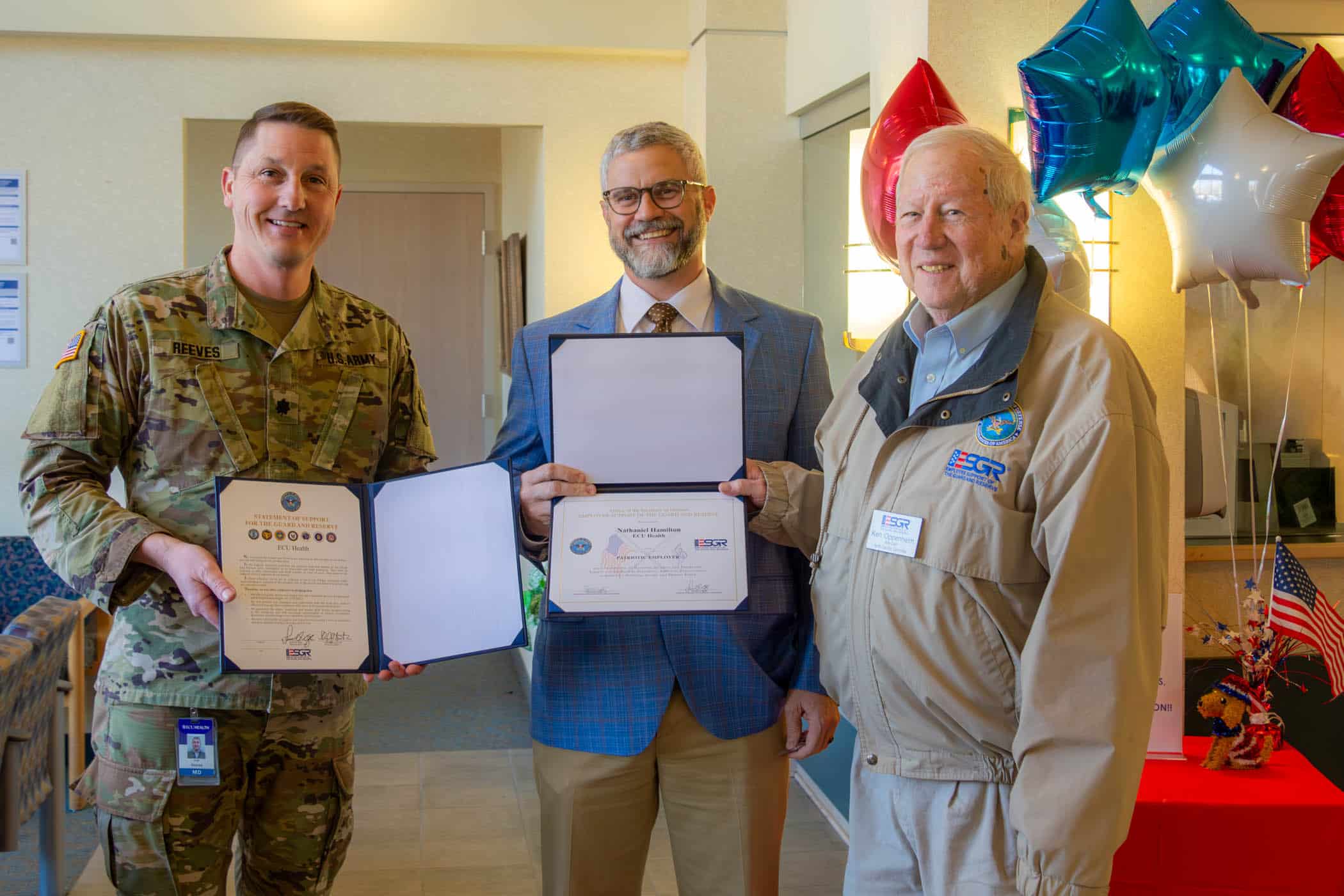
While my path has been different, I feel it’s my duty to support those who serve our country. Dr. Hugh Mallory Reeves is not only a great friend and colleague, but also a true patriot who has made tremendous sacrifices for this nation. It’s a privilege to support him as he fulfills his duty to our country.”
Dr. Hugh Mallory Reeves, a urologist at ECU Health who also serves as a lieutenant colonel in the Army Reserves, nominated Dr. Hamilton for the Patriot Award in recognition of direct and meaningful support. Dr. Reeves, one of only a few urologists serving in the Army Reserves, has balanced his dual careers since 2003 with significant support from Dr. Hamilton and ECU Health.
“ECU Health supports veterans and appreciates their service,” said Dr. Reeves. “If it weren’t for an entity like this and people like Dr. Hamilton, we wouldn’t be able to be here with long careers as physicians and military service.”
Retired Navy Cmdr. Ken Oppenheim, a representative from the ESGR, alongside Dr. Reeves, formally presented the award to Dr. Hamilton, providing an opportunity to celebrate his impactful contributions and recognize the ways he has supported service members and their families.
“ECU Health has always been a strong advocate for serving veterans and supporting our military,” said Dr. Jason Foltz, chief medical officer at ECU Health Physicians. “Dr. Hamilton’s commitment to accommodating physicians currently serving in the military is integral to who we are.”
Anthony Bartholomew, vice president of operations for ECU Health Physicians, echoed these sentiments.
“Dr. Hamilton is a remarkable leader who supports all of his team members – military and non-military – in every way possible,” said Bartholomew. “It’s an honor and a privilege to have someone so dedicated to eastern North Carolina and our patients as part of our team.”
Dr. Hamilton’s nomination was reviewed and approved by the ESGR state committee. The North Carolina ESGR is a Department of Defense office led and operated by volunteers who aim to foster supportive work environments for members of the National Guard and Reserve.
To be a health care provider is to answer a calling. For some, the journey to health care is a straight line; for others, the road is winding. This series features stories from ECU Health team members who took the winding road, but found the destination to be worth the effort.
When Deborah Rice, a staff nurse III on the palliative care unit at ECU Health Medical Center, was 13, her father died; this changed the trajectory of her adult life. “As a young girl, I knew I wanted to be a nurse,” Deborah shared. “But when my father was killed, I didn’t feel like I could put the financial burden on my mother, or leave her home alone with my younger brother, so when it was time for me to go to college, I didn’t go.”
Deborah got married and had children, and for 20 years she worked at a bank as a database analyst.
Then she learned her department was being let go, and she found herself at a crossroads. “My husband asked me if I still wanted to be a nurse, and I said yes.”
Around the same time, Deborah found herself dealing with the illness and death of several family members. “In 2008, my stepfather died from bone cancer, and from that point on for the next two to three years, we lost about five or six others in my family,” she said. “I had a hand in taking care of them when they were in their last days, and it just solidified for me that nursing was where I needed to be.”
With the support of her husband, children and mother, Deborah made the decision to pursue her dream of becoming a nurse. She first earned? her certified nursing assistant (CNA) and applied to nursing school at Edgecombe Community College, and at age 48, she graduated with her associate degree in nursing (ADN). She then went on to East Carolina University to get her bachelor of science in nursing (BSN). After graduation, Deborah knew exactly where she wanted to work. “When I was in nursing school, they were getting ready to build the Cancer Center, and I always said that was where I wanted to work.”
It took some time, but Deborah landed her dream job and now works in the palliative care unit. “It’s a special group that I work with,” she said. “It’s about helping a patient die with dignity and respect. Not everyone has a family, so we are there with those who are alone as well as those with lots of family. And we take care of the patient and their family, helping them get through this difficult time.”
The work is rewarding, but Deborah acknowledged it’s not for everyone. “It takes a special kind of person, somebody with compassion and empathy, because it’s not easy taking care of people who die and their families. But we talk with them and spend time with them, helping them accept what’s going on. You’ve got to love what you do, and our team does.” Not only do they love what they do, but the team supports each other when things get tough. “If we need to go into a room and cry, we go cry. We cry with each other, and we laugh and joke. We have to do all these things to survive.” That level of support is important to Deborah. “My team is very supportive. I wouldn’t work anywhere that didn’t have good teamwork, because that’s what gets you through the day. It encourages us to go forward and do and learn more.”
It’s equally gratifying to make connections with the patients and their families. “I tend to bond with my patients. I keep in touch with some of the family members. They’ll reach out to me from time to time to ask how I’m doing. It’s so great to build those relationships and help people through those times,” Deborah shared.
It’s clear when you talk with her that Deborah loves her work. “It’s been an experience of a lifetime, and it’s one I continue to learn and grow in. There’s never a dull moment. I love oncology and palliative or hospice care, and I keep learning and encourage everyone to keep learning. Love what you do and learn every chance you get.” She also was recently recognized as a Great 100 Nurse of North Carolina, yet another signifier that she is exactly where she should be.
To anyone thinking about starting their nursing career later in life, Deborah quickly offers reassurance. “I’m glad I did it. Even at 48 years old, I wouldn’t change a thing. I try to instill in everyone I meet that you’re never too old to go to nursing school. Even if school is challenging, I say keep going. And if you don’t succeed the first time, but it’s what you really want to do, don’t ever stop,” she said. “I hear people say they would go back to school but they’re 36 and will be 40 when they’re done. I say, you’re still going to be 40; you might as well put that time to good use.”
And Deborah has certainly put her time to good use. “Being a nurse has been the biggest blessing of my life,” she said. “My husband and my mom were my biggest fans. I wouldn’t be who I am today without my mom because she raised me from the time my father was killed. And if my dad was alive, he would be very proud of me. I did it for him as well because I knew he would want me to do it. It was not an easy thing to wait until I was 48, but it was well worth it.”
While Heather Duncan, the director of ECU Health Medical Center’s laboratory services, knew she wanted to work in health care from an early age, her career plans changed when she learned about the medical technologist program at her school. “I thought I’d be a dermatologist,” she recalled. “But I liked biology and science, and the medical tech program fit my interests. That steered my career, and I’ve never looked back.” The South Carolina native has served in her current role at ECU Health for six years, and she is now wrapping up her four-year term with the Clinical Laboratory Improvement Advisory Committee (CLIAC), which is an appointed position. During her time with CLIAC, Duncan has been instrumental in bringing positive change to her profession.
CLIAC is a federal advisory committee that provides guidance to the Department of Health and Human Services (HHS) and is managed by the Centers for Disease Control and Prevention (CDC). The advice and guidance the committee provides pertains to general issues related to improvement in clinical laboratory quality and laboratory medicine practice.
Duncan said she didn’t even know CLIAC existed until a former co-worker approached her to gauge her interest in being nominated for a position. “They asked me if I would be interested, and it was exciting because CLIAC is so impactful.”
In the past four years, Duncan said she’s been privileged to collaborate with 20 other professionals to develop educational resources for the lab community and update the CLIA regulations. During her tenure, Duncan chaired the CLIAC Certificate of Waiver (CoW) and Provider-performed Microscopy (PPM) Procedures workgroups.
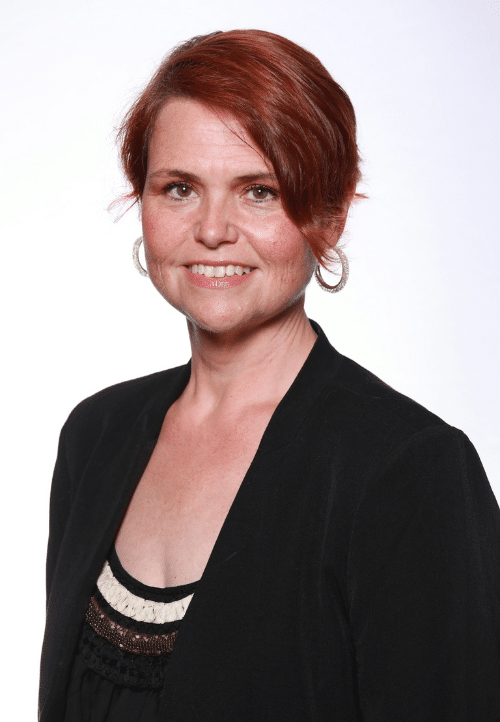
“The work that has come out of those groups has allowed CLIAC to make recommendations to modernize our regulations, which impact the laboratory community at large. We’ll see those impacts here at ECU Health,” Duncan said.
One such regulation restricts who is allowed to train new personnel to perform certain functions in the lab. With Duncan’s work, the regulation has now expanded to allow more people in the lab community to perform that training. “Because there is such a workforce shortage with laboratory technicians, this is impactful by expanding who can provide training, and it improves the overall quality of lab testing,” Duncan said. Caryl Havasy, the system administrator for laboratory services, sees Duncan’s work with CLIAC as instrumental in gaining more lab technicians. “ECU Health, like other health systems, faces an ongoing shortage of laboratory testing personnel. Heather’s experience in laboratory operations and regulatory compliance in our rural-focused health system brings a much-needed perspective to the work of CLIAC, specifically its role in creating the regulatory structure that defines the qualifications for frontline laboratory roles,” Havasy said.
Another exciting recommendation that emerged from the most recent CLIAC meeting would allow for virtual competencies, which would expand training capability and incorporate cutting edge technology into practice. “Because we serve rural communities, having this technology would cover a huge network,” Duncan shared. “We have benefitted from having a direct pipeline to the work CLIAC is doing. For example, our lab was one of the initial beta testers for virtual lab safety training. They sent us four Oculus headsets and they push new training programs to us.”
While this technology isn’t widely used yet, Duncan said being a part of an organization that promotes advancements in technology and makes recommendations on a federal level is gratifying. “This work allows for a forward-thinking process, and it will impact our whole community,” she said. “Our vision is to be the national model for rural health care, so we should use every tool available. Being a part of CLIAC means I’ve been able to make a real difference.”
Havasy highlighted other areas CLIAC and Duncan’s work with the committee makes an impact, including, “a change to rules surrounding histocompatibility testing (performed to match organ donors with recipients, i.e., kidney transplants) that will remove specific requirements for obsolete methods and practices, accept newer testing techniques and eliminate redundant requirements. This will result in a decreased compliance burden on the laboratory and more efficient testing for our eastern NC kidney transplant patients.” Duncan also worked with the CoW workgroup, which addresses regulations as they pertain to labs with a Certificate of Waiver. This waiver is granted to labs that only perform waived tests, which are simple laboratory procedures and examinations with a low risk of an incorrect result (including urine pregnancy tests or blood glucose monitoring). Labs must pay certification fees every two years to acquire and maintain the certificate. Duncan explained that one area her workgroup focused on was an updated fee schedule. “CLIA is a self-funded program, and they haven’t updated their fees in a long time,” Duncan explained. The group also worked on establishing a broader range of sanctions for laboratories that operate under a Certificate of Waiver but are not compliant with the CLIA regulations.
Because of her work with CLIAC, Duncan said ECU Health has a seat at the table and can provide input for advancements in laboratory operations. “Through these efforts,” Havasy added, “Heather embodies the ECU Health vision of bringing our rural health care system needs and potential solutions to a national stage, impacting not only our own operations but those of every health care system across the country.”
Across the ECU Health system, hospitals recognized Veterans Day with events honoring those who have served our nation and thanking those who have chosen to serve in a new way at ECU Health.
At ECU Health Medical Center in Greenville, team members gathered around the flagpole just after 9 a.m. to come together, connect with other veterans, and appreciate one another’s service to the country and eastern North Carolina.
Dr. Virginia Hardy, vice president and chief inclusion and belonging officer at ECU Health, hosted the event and welcomed in team members.
“Today, we celebrate not only your past service, but also your legacy of courage and honor,” she said. “Our veterans remind us that our freedom is not just a right, it is a responsibility. Freedom today means different perspectives, engaging and constructive dialogue and ensuring that every voice has been heard.”

Cameron Graham, manager of electrical and mechanical systems in Plant Operations at ECU Health, gave a roll call for each branch of the United States military with veterans responding with their branch battle cry.
He shared that his service in the Navy helped shape his perspective as a leader and in his daily work at ECU Health.
“My brother was in the service, also in the Navy, and he was kind of my hero, so I followed his tracks,” Graham said. “When I attained the rank of Chief, we used to do what was called an initiation. You’re taught humility, to never forget from whence you came, and those who made you who you are. That has served me well, not only in the military but at ECU Health as well.”
Wayne Waters, a mechanic with Plant Operations at ECU Health, led the Pledge of Allegiance during the event. He served in the National Guard and said he took lessons from his time in the service that he sees in his work each day at ECU Health.
“A lot of my family in the past had been military, so growing up it was just the right thing to do. I’m just proud to be a part of the service,” Waters said. “Being young and going in, it helped me with structure in my life. It really taught me to be team player, being part of a team and working together.”
Trish Baise, chief nursing executive at ECU Health, said as the daughter of a veteran, she’s proud to participate in these events and recognize others for their service and sacrifice.
She said the sense of service in those who serve in the military does not fade and we see that each day in eastern North Carolina and at ECU Health.
“Our neighbors, friends and family members who have served often return home to continue their legacy of services,” Baise said. “They become teachers, first responders, health care professionals and community leaders. The sense of commitment is part of what makes eastern North Carolina unique – a place where selflessness and service are not just values, but a way of life.”
At ECU Health, we’re grateful today and every day for the service of our veterans. We’re proud of the more than 550 ECU Health team members and 60 medical students, faculty and staff at the Brody School of Medicine who have decided to continue their service to others after their time in the military.

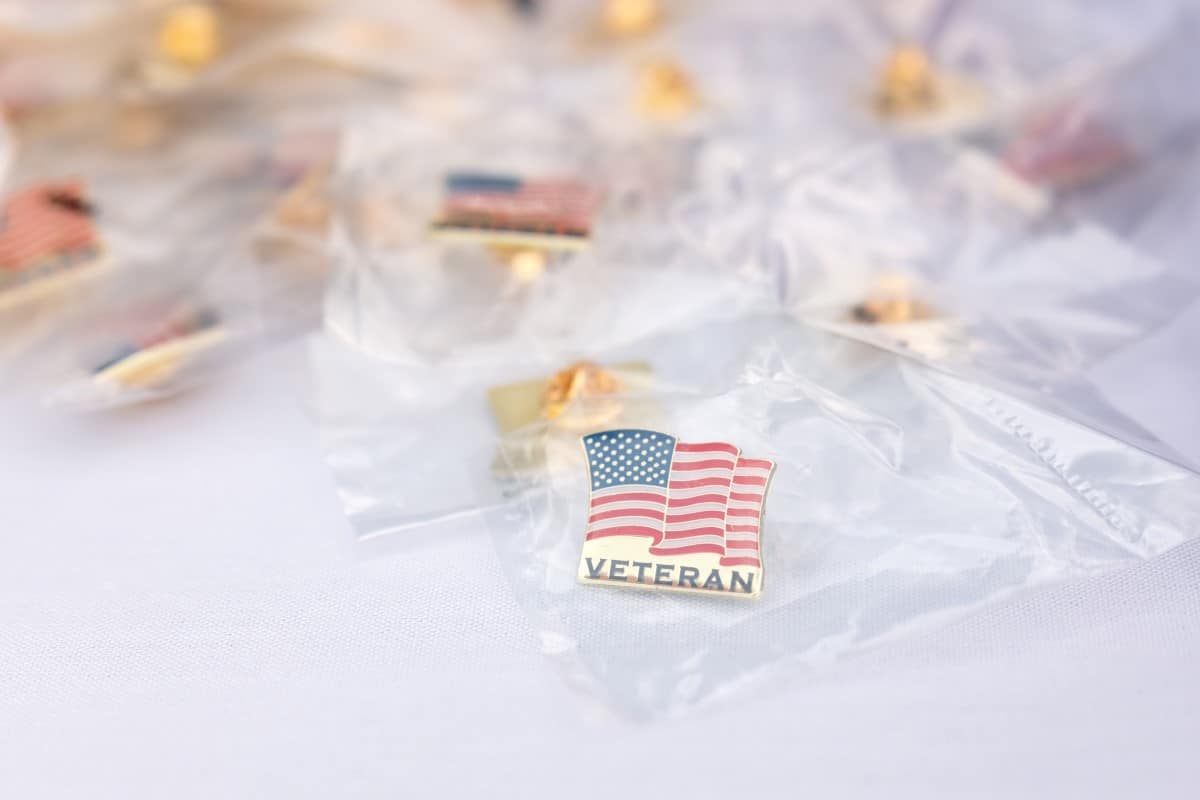
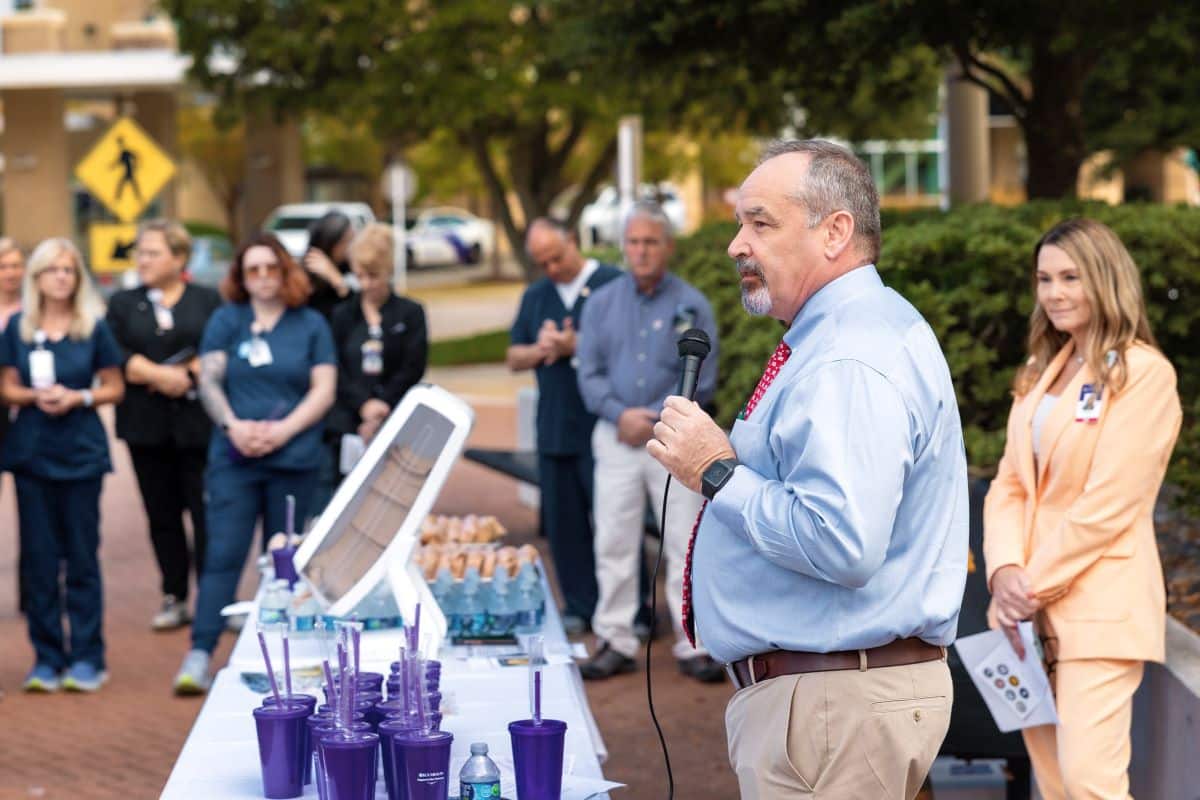
Candace Cahoon, the respiratory care manager for the Pediatric Asthma Program, presented in July at the National Association of Asthma Educators (AAE) annual conference in Charlotte, North Carolina. The AAE is dedicated to providing quality education to a multidisciplinary group of asthma educators, and members include respiratory therapists, nurses, pharmacists, physicians, social workers, nurse practitioners and others. Cahoon’s presentation is one way the Pediatric Asthma Program at Maynard Children’s Hospital strives to share its research, lessons learned and processes for establishing a national model for a pediatric asthma program in the United States.
Cahoon has worked with ECU Health for 10 years, and during that time she has continued her education from a bachelor’s degree in sociology and an associate’s degree in respiratory therapy, to a master’s in health education and several certifications.
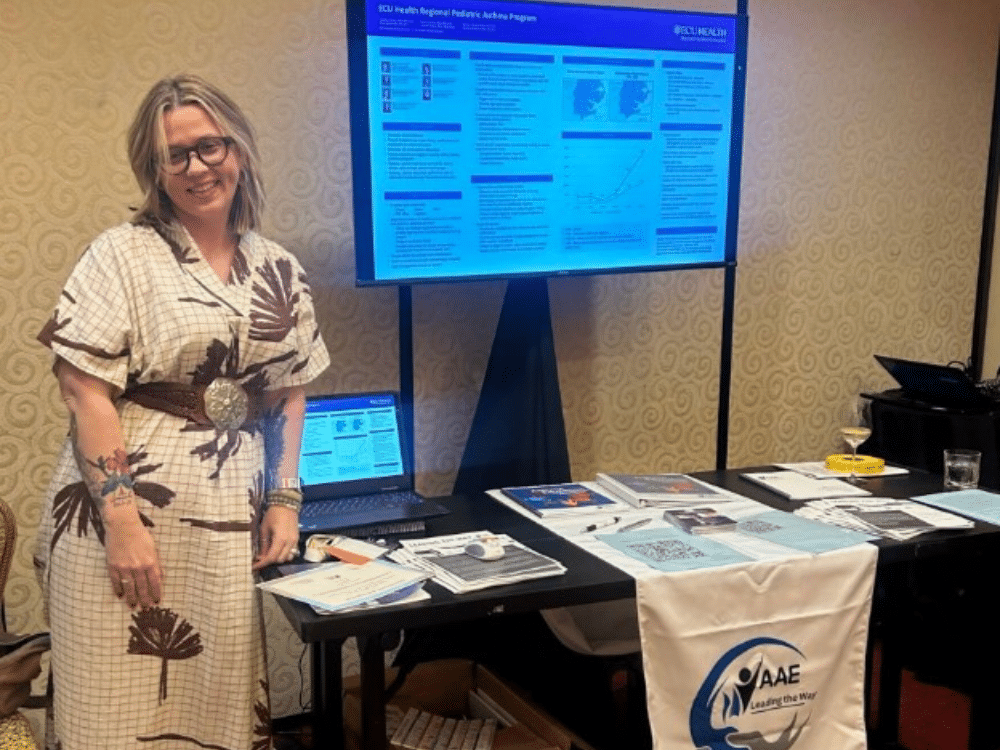
The Pediatric Asthma Program, which has grown from serving two counties in 1995 to 29 counties today, aims to reduce emergency department and inpatient admissions for children with asthma, decrease school absenteeism and increase the quality of life for children with asthma in eastern North Carolina. It does this by offering asthma testing, asthma education, tools to manage asthma, access to community resources and medication assistance. Their work with eastern North Carolina public schools has been a particularly effective way to reach children in rural North Carolina communities.
The poster Cahoon presented was the collaborative work of the Pediatric Asthma Program’s entire team, and the goal was to educate others on how to establish and support a pediatric asthma program. “We’re one of the best programs in the nation,” Cahoon said. “We are ahead of the game in terms of what we address for our patients with asthma. I go to conferences and say, ‘we know this; we do this,’ so we are well-known in the state and nationally.” Sue Anne Pilgreen, the manager of the Pediatric Asthma Program, said Cahoon is the “teacher” of their team. “She is a lifelong learner,” she said. “While the content development was a team effort, Candace pulled it all together, submitted the abstract and ultimately showcased our great work.”
Cahoon shared that the Pediatric Asthma Program is now establishing its own professional conference: Pediatric Asthma Management: Providing Holistic Care to Rural Communities. The conference is scheduled for February 28, 2025 and will be held at the Eastern Area Health Education Center, with virtual and in-person capability. Cahoon leads the committee responsible for making the conference a reality. “We want to show how we are touching every single aspect of an asthmatic patient’s life,” Cahoon said. “We have worked to expand and grow our program over the past few years, and we’ve had countless people ask us how we ‘found’ our success, especially in such a rural area,” Pilgreen added. In answer to that, the conference will address key components involved in implementing a comprehensive asthma program, while also discussing the clinical components of how the asthma team treats patients with asthma and helps them transition to home. “We’ll have a case study that goes through the hospital or clinic and has a breakdown of testing, education, home visits and environmental assessments for the patients,” Cahoon shared. The team will also talk about Single Maintenance and Reliever Therapy (SMART) as a new treatment option for patients with asthma that combines in a single inhaler both a corticosteroid and a long-acting beta-agonist so it can be used as a daily maintenance and as-needed relief of asthma symptoms. “The overarching objective for the conference is to help participants to utilize clinical knowledge, skills and expertise to provide holistic pediatric asthma care in the community,” Pilgreen said. “We know this starts in multiple places, including the hospital bedside, schools, and primary care provider offices.”
Ultimately, attending conferences, as well as establishing a conference of their own, highlights and shares the innovative work of the Pediatric Asthma Program at Maynard Children’s Hospital. “It shows that we’re here and we can do this together,” Cahoon said. “We are more than willing to show how over the last 20 years we have put this program in place.” Pilgreen agreed: “The design of our program is unique. Having the opportunity to present our program model and outcomes at a national conference not only elevates our work, but it also gives others the tools to replicate our model in their area. Our goal is to increase the quality of life for children with asthma, regardless of where they live.”
In celebration of the season, Maynard Children’s Hospital patients, families and team members had a chance to recognize Halloween and bring a sense of normalcy around the day.
Team members from across ECU Health and some community groups came together inside the children’s hospital to dress up and let the children see some of their favorite characters, like Mario, Woody and Buzz from Toy Story, and everyone from Inside Out.
Some tables set up inside Maynard Children’s Hospital even offered interactive games for the kids to play while they were picking up goodies from each team. Those involved said this is one of the most special events of the year, where teams can share a bit of normalcy with the youngest patients at ECU Health Medical Center.
Amanda Jones, a child life specialist at Maynard Children’s Hospital, said she’s grateful to work with a team whose role is to put a smile on children’s faces.
“That’s part of our role here, we try to bring some fun to Maynard Children’s Hospital,” Jones said. “Kids and their families have to be here, so we just try to celebrate holidays, celebrate milestones and bring some of their home to them while they’re in the hospital.”
Jones said while the event takes a lot of planning and organizing, the team member engagement makes it easy to pull together and generate excitement. After four years of hosting a parade outside of Maynard Children’s Hospital, the event moved back indoors this year for a more interactive experience for patients and families.

One of those patients was Aleksandra, who was dressed as Belle from Beauty and the Beast during the event. She said it made her day to see the Minecraft booth set up from one of the teams.
“It was fun to go trick-or-treating and see all the booths. There were so many different booths, it was just really fun,” she said. “Being able to do this with other people, who some of them might have the same condition as me, that was a good memory.”
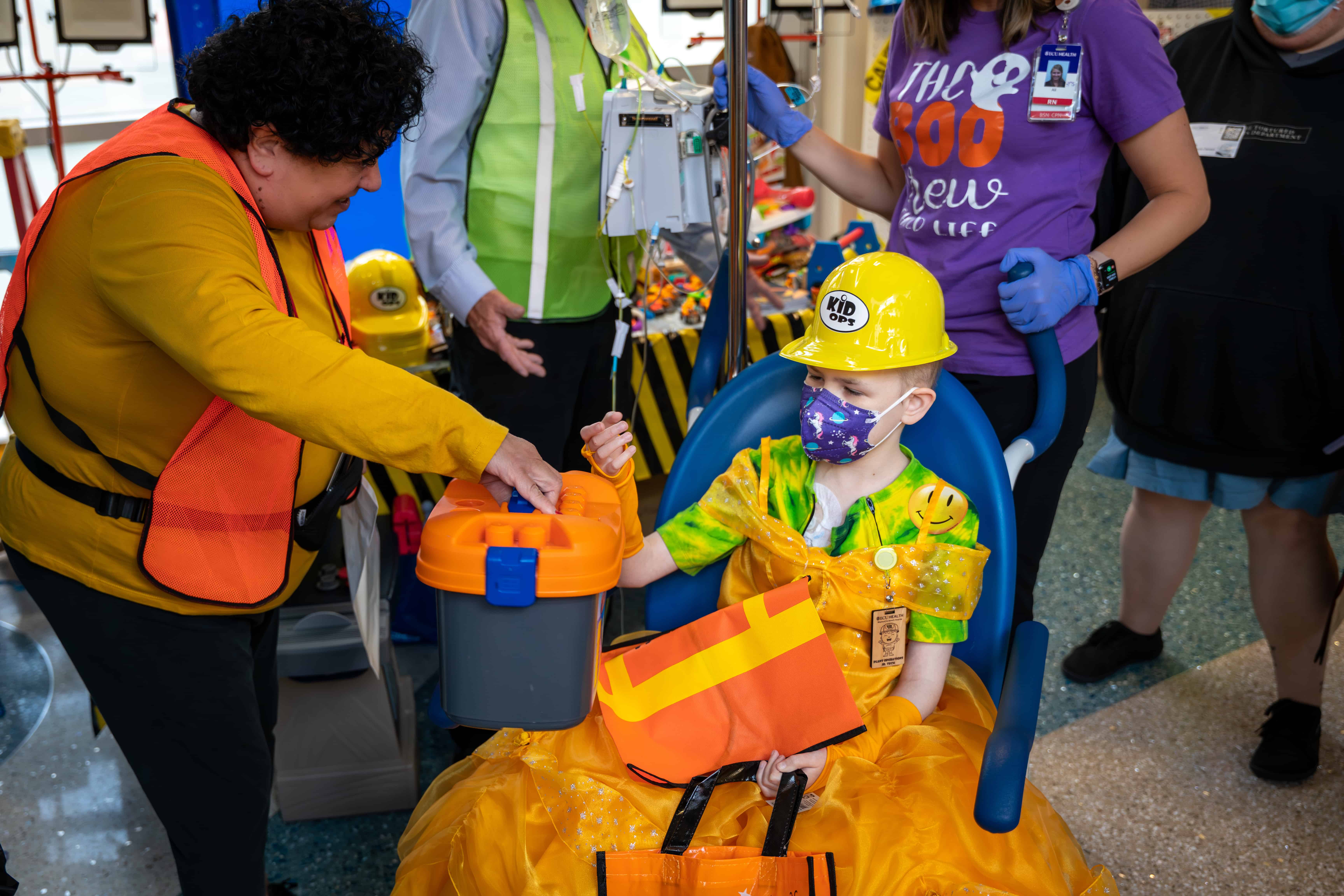
Her mother, Lydia, said she was grateful for her daughter to have something to look forward to for Halloween while she’s in the hospital. For herself, Lydia said it was nice to see Aleksandra and so many other children light up as they went through the different booths.
“It’s wonderful that they put on an event like this so that all of the children who are missing out on Halloween get this experience,” Lydia said. “I love seeing them have the moment of just being a kid, wearing a costume and forgetting for a day that they’re in the hospital.”
Lydia said she had a great time watching her daughter, other patients and even parents interacting with an Inside Out booth, complete with a replica console from the movie.
Tara Stroud, vice president of Women’s and Children Services, said team members step up in many ways to be there for the patients and families served at Maynard Children’s Hospital and this event is a true example of that commitment.
“There’s something about being able to work in a children’s hospital and really give the child the experience of being a child, whether they’re sick or not,” she said. “It gives a heartwarming feeling to the team to know that we’re going to make a difference – whether it’s caring for them medically or it’s just putting a smile on their face.”



There were plenty of smiles and handshakes at the Teachers of Quality Academy (TQA) 7.0 Recognition Ceremony on Sept. 30, as 37 graduates from the most recent TQA cohort celebrated successful completion of the program alongside ECU Health and Brody School of Medicine leaders.
TQA is a professional development program for health care leaders designed to fundamentally change care delivery through a curriculum focused on building knowledge and skills in Health Systems Science which comprehensively explores how health care is delivered. Participants engage in advanced learning in quality improvement, patient safety and team leadership, develop improvement projects to apply these skills across the health system, teach others in their environment about these concepts and evaluate the outcomes of improvement interventions. Leading by example, TQA participants promote a culture of quality and safety across the enterprise.
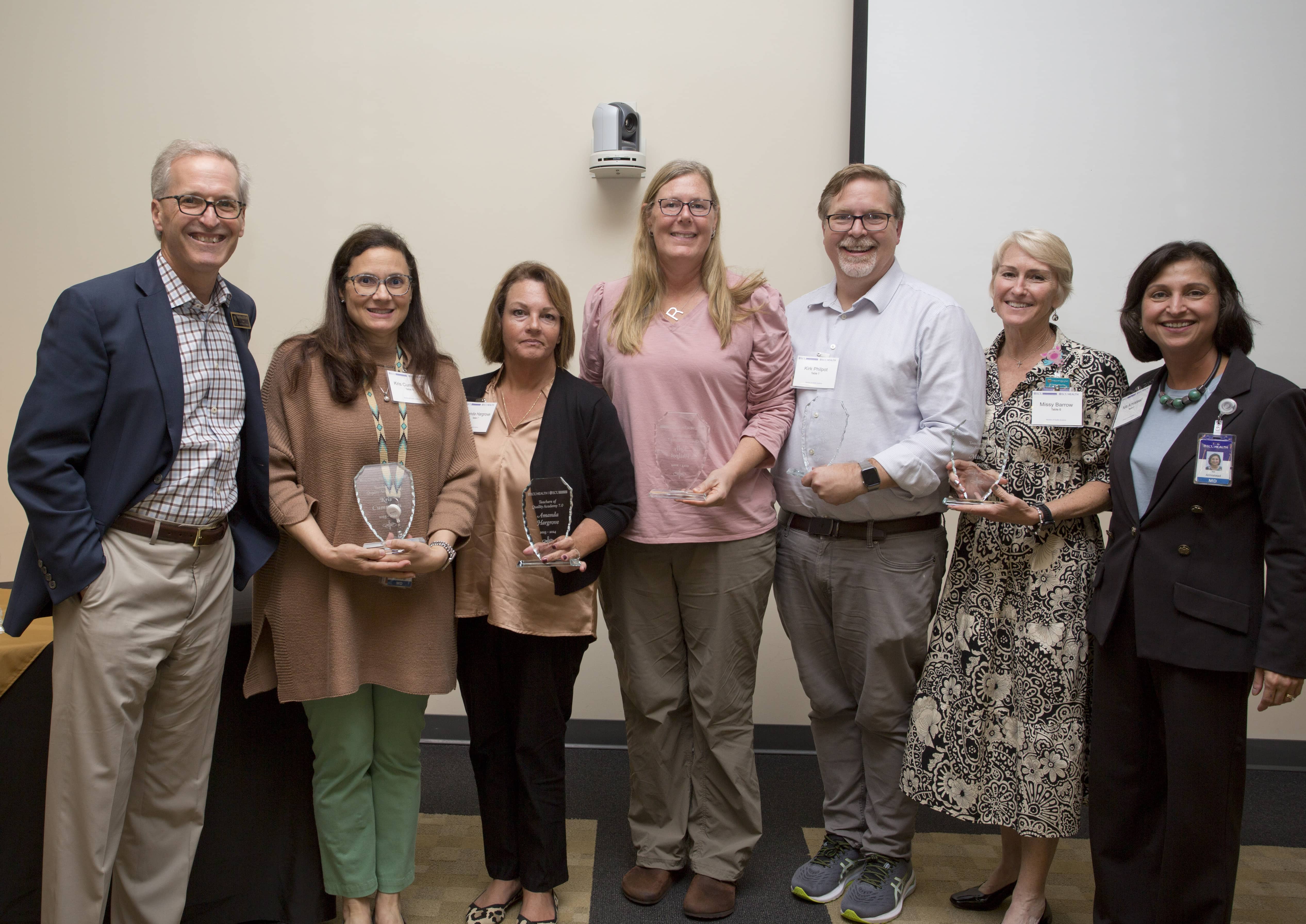
This year’s program graduates came from multiple areas of expertise and locations, including ECU Health Physicians, ECU Health Medical Center, ECU Health North Hospital, ECU Health Chowan Hospital and Contentnea Health. Additionally, the cohort includes participants from ECU Health’s Rural Family Medicine Residency Program, ECU Health’s Administrative Fellowship Program and the MedServ Fellowship Program.
“As an academic health care organization, it’s incredibly gratifying to see educational programming like TQA woven into ECU Health and Brody’s culture of quality improvement,” said Dr. Michael Waldrum, ECU Health CEO and dean of Brody. “You can see and feel the pride that people take in improving quality, and that has real tangible impacts on patients who can experience better health and wellness as a result. This cohort and these graduates are an example of our quality improvement culture which TQA has helped build.”
According to Dr. Jennifer Sutter, TQA physician director, the diverse, multidisciplinary class represented the ultimate goal of the program: to further knowledge and instill principles that help health care professionals across eastern North Carolina improve quality on behalf of the patients they serve.
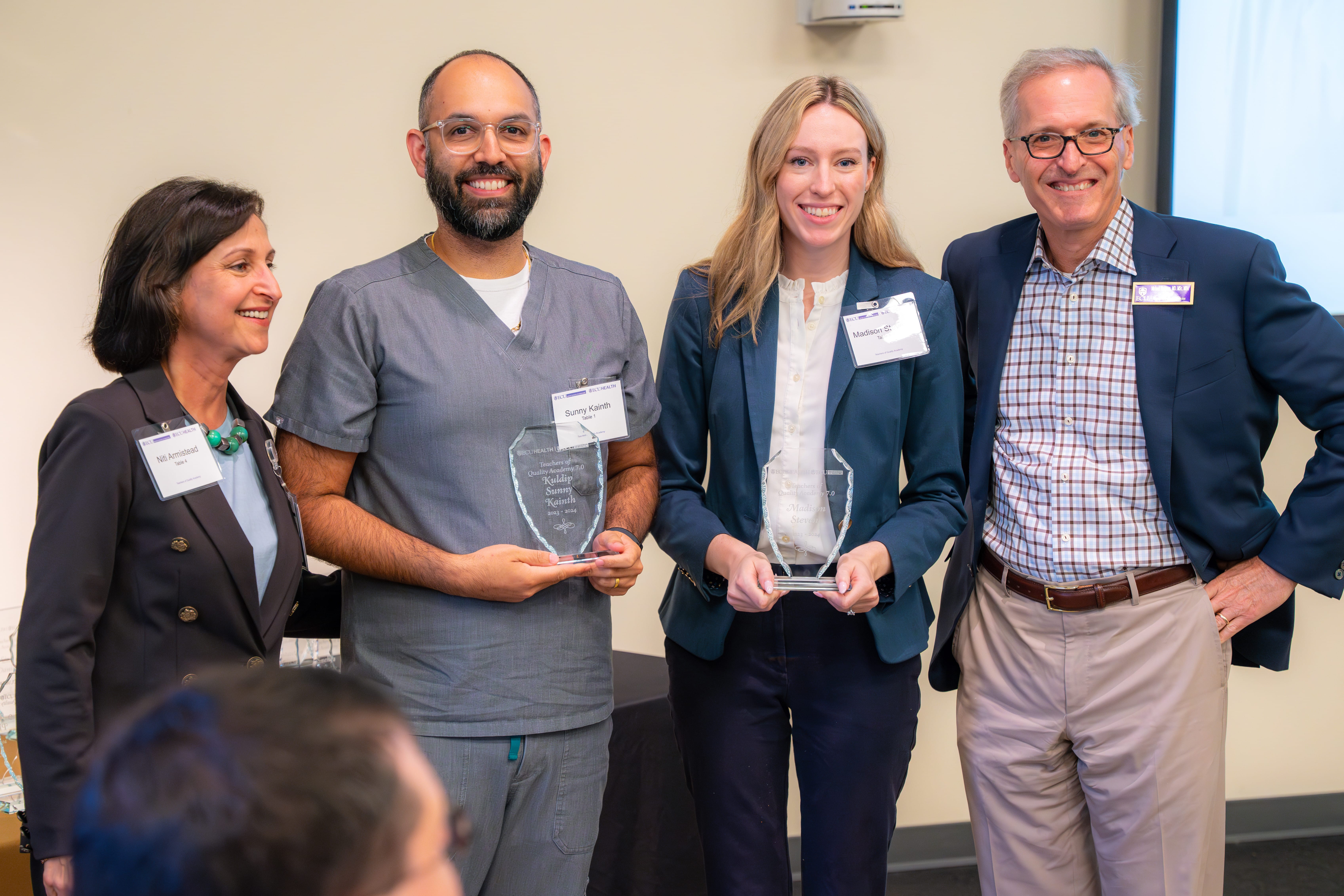
“It is exciting for us as program leaders recognize and celebrate these dedicated health care professionals for successfully completing TQA,” Sutter said. “Those of us involved in the program have been fortunate to witness incredible growth from our 7.0 cohort. We could not be more proud of what they’ve accomplished and how they will use their knowledge and skills to help further high-quality care in their individual clinical setting through out eastern North Carolina.”
The seventh iteration of the program was comprised of 12 half-day sessions alternating concepts of leadership development and new competencies of Health Systems Science, including patient safety, quality improvement, systems thinking, population health and team-based care. Each learning session also emphasized wellness topics enabling participants to engage in supplemental activities to further enhance the experience of life while at work. The year-long program culminated in each participant completing a comprehensive quality improvement project in their area of focus.
“As part of TQA, I had the honor of partnering with leaders from our community hospitals—North, Chowan, and the Medical Center—all of whom shared a commitment to serving our community,” said ECU Health administrative fellow Madison Stevens, a member of the 7.0 cohort. “The sessions empowered us to explore and refine our leadership philosophies, building a strong foundation rooted in quality improvement, professional growth, and innovation. The program has equipped me with the tools to become an effective and open-minded leader. In our project, my team focused on post-event debriefing in the emergency department, prioritizing the well-being of our team members alongside clinical learning to help teams navigate high-stress situations and improve patient care outcomes. We look forward to sharing our results and broadening our focus on quality improvement to provide exceptional patient care.”
The TQA curriculum is also designed around experiences that span the continuum of care in multiple areas of clinical focus which enables participants to be better prepared to meet real-world challenges. This intentional design, according to ECU Health Chief Quality Officer and Chief Clinical Officer Dr. Niti Armistead, enables TQA graduates to immediately help drive quality improvements in the clinical environment.
“TQA is so important because it creates a community of interdisciplinary professionals committed to improving quality both here at ECU Health and beyond,” Dr. Armistead said. “Quality is a critical component of our quintuple aim and the work being done by TQA program leaders and participants directly ties to our ability to improve the health and well-being of the region. Through TQA, participants learn by doing and acquire collaborative problem resolution skills to drive continuous improvement.”
As recovery efforts continue following Hurricane Helene’s devastating impact in western North Carolina, team members from the east continue to do their part in support of those impacted.
The local efforts, led by the Eastern Healthcare Preparedness Coalition (EHPC) at ECU Health, include boots-on-the-ground contributions that started immediately after the storm hit the state and continue today in various capacities.
Chris Cieszko, Disaster Services Specialist with EHPC, was among the first group of team members to travel to western North Carolina in the Medical Ambulance Bus the day after Helene hit the western part of the state. Along with other members of EHPC, Cieszko said they helped with the immediate response which included logistical support during the staging period such as changing batteries, loading trailers and “a little bit of everything” to help manage supplies.
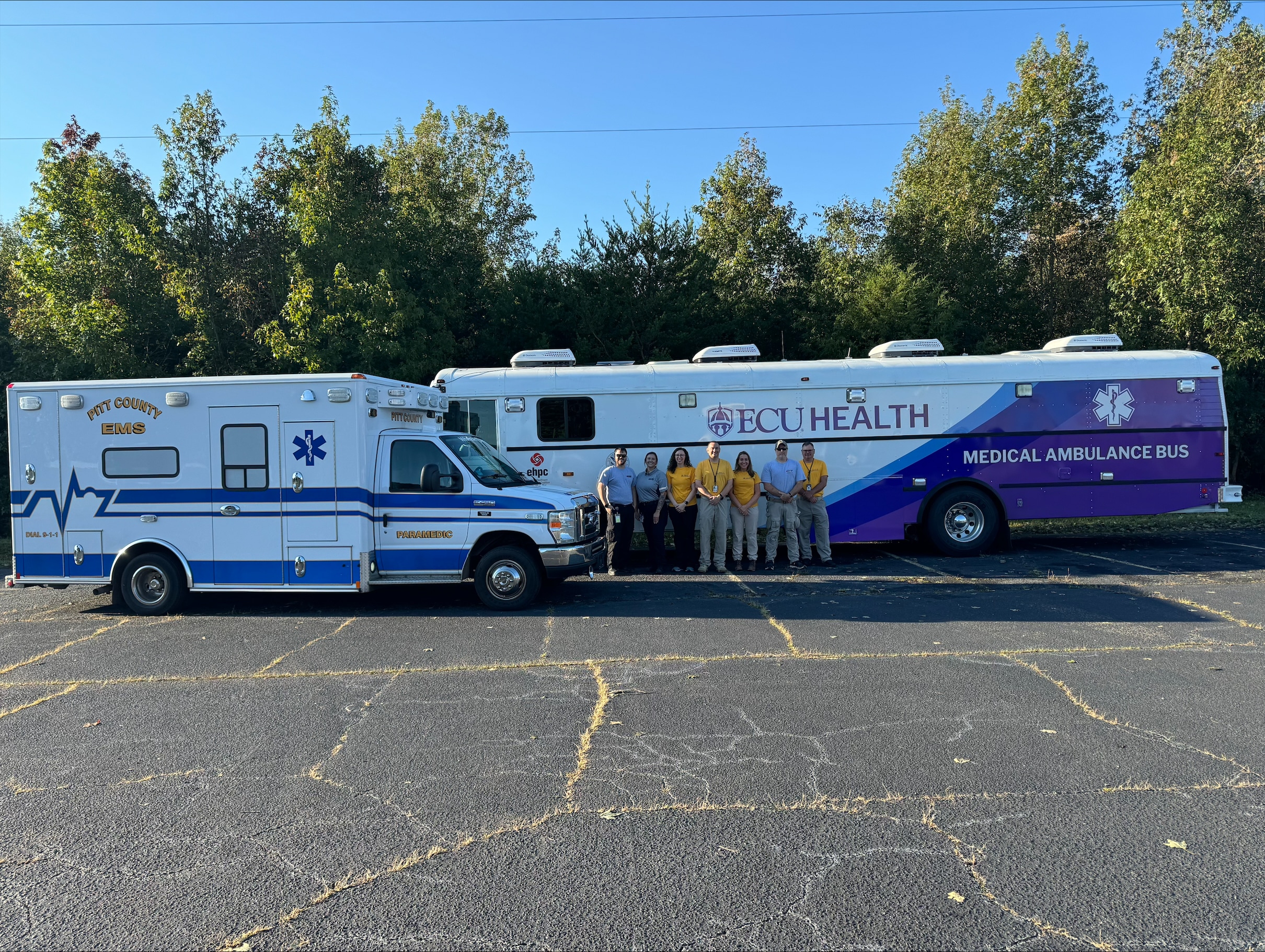
Using the medical bus, the team partnered with Lumberton Rescue Squad and assisted with the local EMS response from Linville-Central Rescue Squad to help evacuate 23 patients from a damaged assisted living facility in Grandfather Mountain to a safer location away from the impacted area.
“It was obviously a difficult situation given the conditions and circumstances,” Cieszko said. “No one wants to leave the comfort of their own living space. We were able to talk to them, take care of them and ultimately get them to a safe location. The entire response was a true testament to the teamwork between EHPC, Linville-Central Rescue Squad and of course our sister agencies in the North Carolina Healthcare Preparedness.”
The EHPC team also helped with technology and communication needs in the immediate aftermath of the storm, which is a vital asset to disaster response. Matthew McMahon, disaster services specialist with EHPC, helped connect a Starlink to the medical bus ensuring it had internet, and programmed helicopters to provide connectivity with ground support.
Recovery efforts have not stopped since Helene’s arrival, and neither has EHPC. Chris Starbuck, Healthcare Preparedness Coordinator with EHPC has been stationed in Raleigh at the North Carolina Department of Public Safety Emergency Operations Center. His role includes supporting health care staffing needs at all several operational sites managed by the state.
These needs, along with EHPC support, represent the importance readiness to respond to disasters immediately, while also being prepared to provide long-term help as recovery efforts continue.
“A huge outpouring of medical personnel from all over NC have volunteered to assist with the response efforts in the west,” Starbuck said. “Many are wondering ‘when’ they are going to get a chance to help. We can be ready for when the call comes. Have plans for your family, kids, and pets along with working with your employer so they can plan schedules.”
In March of 2021, Jalen Hill, MLT (ASCP)CM, joined ECU Health Beaufort Hospital as a cook in the Food and Nutrition Services department. “I wanted to go to culinary school,” he said. “But once I was at the hospital, I found out about a whole other world of opportunities.”
Those opportunities began with one conversation with Human Resources (HR). “Someone in HR heard me talk about wanting to do something different,” Jalen shared. “I wanted to be more involved and out in the field, doing patient care. I was considering going into radiology, and I thought I could train in phlebotomy and then transfer into a radiology program; but then the person in HR talked to me about the medical laboratory technician (MLT) role, which I had never even heard about. She was the one who set me up with the lab to do some job shadowing, and that was the spark.”
From there, Jalen entered the medical laboratory technician program at Beaufort County Community College in August of 2021, and at the same time, he also trained as a phlebotomist. In July 2023 he completed his phlebotomy training, and in May of 2024 he graduated with an associate degree in medical laboratory technology. That following June he began working at the hospital as an MLT.
Now Jalen truly enjoys his work and the chance to meet different people every day. “You are talking to people and hearing their stories every day. I’m drawing blood to help doctors, and I’m in the lab running tests to help get a diagnosis. That means a lot,” he said. He also values his co-workers, without whom he might not have found his true calling. “In this job, I’ve gained friendships and I’ve learned a lot. Andrea Latham and Sherry Langely were the ones who encouraged me to train as a phlebotomist and let me shadow in the lab. When I was in school, I still worked in the cafeteria, and they’d come by and ask how classes were going. They offered to help if I had any questions. I appreciated them checking up on me.”
The Washington, North Carolina native is now pursuing a bachelor’s degree in medical laboratory science at Winston-Salem State University, and he is already considering his future education and career options. “I’ve researched forensic science, but I’ve also looked into a master’s in business administration or a master’s in public health, where I could be an epidemiologist or toxicologist. It feels good to have these opportunities ahead of me,” he said.
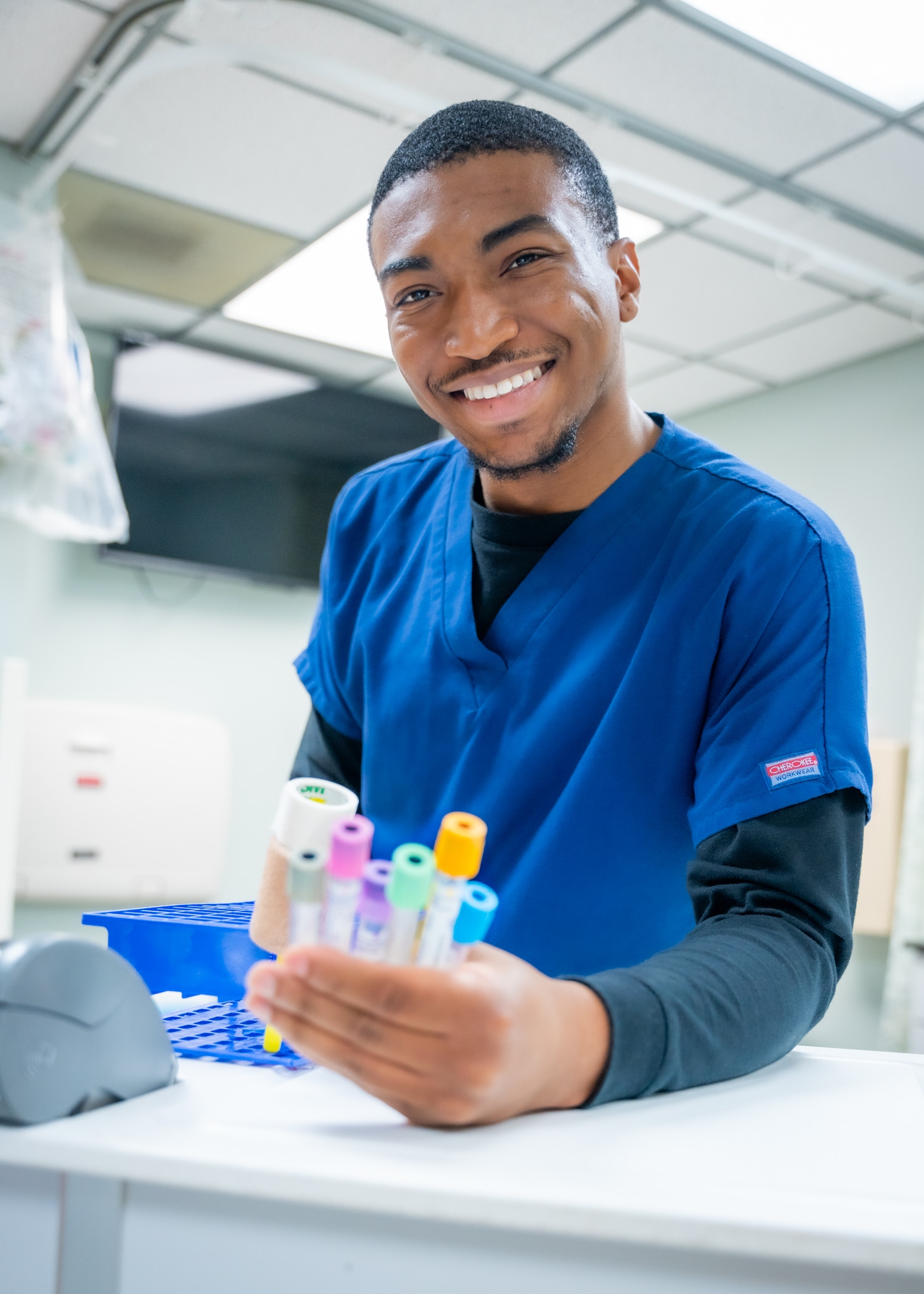
To anyone considering making a career shift to health care, Jalen said go for it. “It’s a great decision. You have a direct influence on people’s lives every day. Every time you clock in, you are doing something that’s meaningful to someone, whether it’s a simple blood draw or talking to a nurse about lab test results. It’s a rewarding career.”

